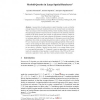Free Online Productivity Tools
i2Speak
i2Symbol
i2OCR
iTex2Img
iWeb2Print
iWeb2Shot
i2Type
iPdf2Split
iPdf2Merge
i2Bopomofo
i2Arabic
i2Style
i2Image
i2PDF
iLatex2Rtf
Sci2ools
136
Voted
SSD
2005
Springer
2005
Springer
Medoid Queries in Large Spatial Databases
Assume that a franchise plans to open k branches in a city, so that the average distance from each residential block to the closest branch is minimized. This is an instance of the k-medoids problem, where residential blocks constitute the input dataset and the k branch locations correspond to the medoids. Since the problem is NP-hard, research has focused on approximate solutions. Despite an avalanche of methods for small and moderate size datasets, currently there exists no technique applicable to very large databases. In this paper, we provide efficient algorithms that utilize an existing data-partition index to achieve low CPU and I/O cost. In particular, we exploit the intrinsic grouping properties of the index in order to avoid reading the entire dataset. Furthermore, we apply our framework to solve medoid-aggregate queries, where k is not known in advance; instead, we are asked to compute a medoid set that leads to an average distance close to a user-specified parameter T. Comp...
Related Content
| Added | 28 Jun 2010 |
| Updated | 28 Jun 2010 |
| Type | Conference |
| Year | 2005 |
| Where | SSD |
| Authors | Kyriakos Mouratidis, Dimitris Papadias, Spiros Papadimitriou |
Comments (0)

